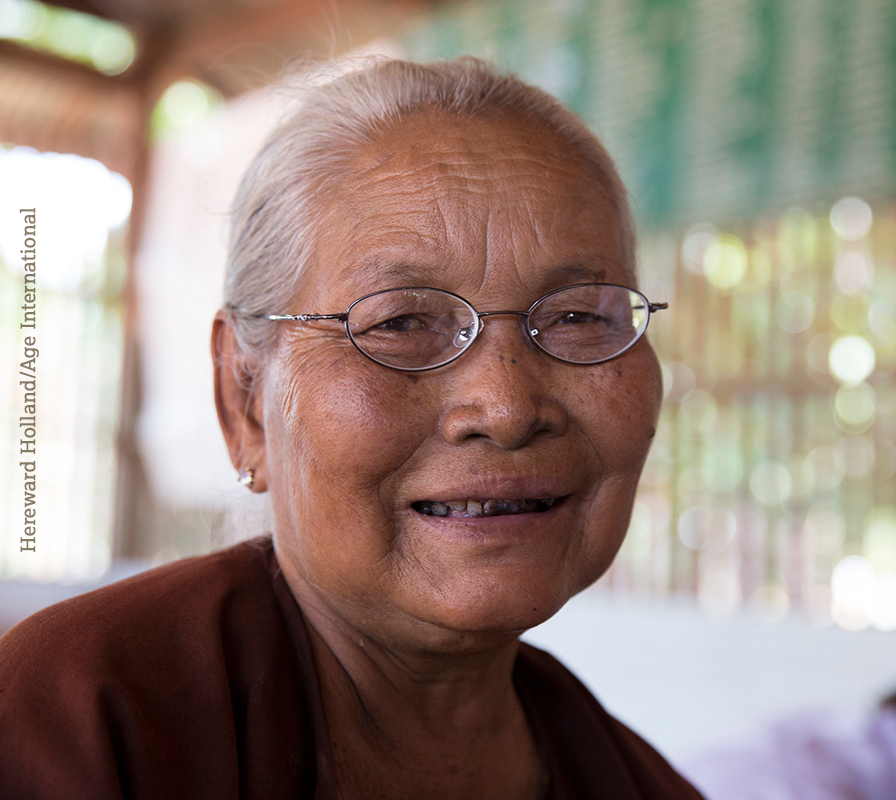Today (Wednesday 25 November) HelpAge International is launching a quick, simple and low-cost tool to assess the needs and vulnerabilities of older people in humanitarian situations.
The rapid assessment method for older people (RAM-OP) is a house-to-house survey that can be used to assess the nutrition status of older people as well as a range of vulnerability factors, some of them specific to old age.
The new approach was developed with Valid International and Brixton Health with funding from the ELRHA’s Humanitarian Innovation Fund[i]. The method needs a sample of 192 people, a notable improvement on previous techniques needing more than 600 people to take part.
Extensive trials in Tanzania and Ethiopia in both urban and rural settings have shown that the method is as effective as existing tools but cheaper, quicker to implement and provides a wide range of indicators. Evidence of older people’s needs in humanitarian contexts is often lacking and many agencies mistake this for evidence of a lack of need.
“We hope this method will contribute to a better understanding of older people’s requirements in humanitarian contexts”, said Dr Pascale Fritsch, Humanitarian Health and Nutrition Adviser with HelpAge International.
“We are now able to rapidly produce strong evidence on older people’s mental and physical health, on their nutrition and food security status, their diet, or their access to basic services. The method is designed to be used by all types of agencies, from national and international NGOs to governments or UN agencies, in humanitarian contexts but also in development settings”, she said.
Older people have specific needs. In the nutrition sector, they need access to nutrient-rich easily digestible food, adapted to those with chewing problems. In emergency situations, older people often find food rations inappropriate to their taste and needs, have difficulties accessing the distribution points and are unable to transport rations home. As a result, older people may become malnourished and need targeted food interventions. In the health sector, older people need a continuity of treatment and care, provided by staff aware of their health problems, and in health facilities that are easily accessible and age friendly. Disabilities are often associated with age, and contribute to the vulnerability of older people when there is a crisis.
The rapid assessment method for older people (RAM-OP) is the first assessment tool that takes into account all these aspects of older people’s needs. The survey provides a wide range of standard indicators on nutrition and food security (e.g. prevalence of malnutrition, frequency of meals, hunger scale), but also indicators that have been specifically adapted to reflect older people’s needs (such as an analysis of micronutrients intake, a dementia screening, an evaluation of the respondents’ level of independence in their activities of daily living, or their level of psychological distress). It also generates indicators on access to health or care services, or access to safe drinking water and sanitation.
The method is rapid and cost effective because it only requires surveying a small sample of individuals and this can be done in less than a week, with 3 or 4 teams of 2 trained enumerators. It is easy to use, as all the tools needed to implement it are provided; a user manual, the questionnaire (in English and in French), the data entry files, and immediate data analysis through access to the free accompanying software. All these tools are free open source.
HelpAge, Valid International and Brixton Health, supported by the Humanitarian Innovation Fund, have designed and tested this method for humanitarian agencies, to encourage them to assess the specific needs of older people. Having generated evidence of these needs, it is anticipated that interventions will be planned that include older people in all sectors of a humanitarian response.
ENDS
[i] The Humanitarian Innovation Fund is a programme managed by ELRHA (Enhancing Learning and Research for Humanitarian Assistance) co-funded by aid from the UK Department for International Development (DFID) and the Swedish International Development Agency (SIDA). Visit: www.humanitarianinnovation.org for more information.
Download press release here.
Notes to Editors:
1.This project is supported by the Humanitarian Innovation Fund, a non-profit grant making facility supporting organisations and individuals to identify, nurture and share innovative and scalable solutions to the challenges facing effective humanitarian assistance.
The Humanitarian Innovation Fund is a programme managed by ELRHA (Enhancing Learning and Research for Humanitarian Assistance) co-funded by aid from the UK Department for International Development (DFID) and the Swedish International Development Agency (SIDA).
Visit: www.humanitarianinnovation.org for more information
2. HelpAge Internationalhelps older people claim their rights, challenge discrimination and overcome poverty, so that they can lead dignified, secure, active and healthy lives. Our work is strengthened through our global network of like-minded organisations – the only one of its kind in the world. Visit: www.helpage.org
3. Valid International promotes evidence-based reform of humanitarian practice. The organization is best known for its work leading up to the international adoption of the community-based management of acute malnutrition. Visit: www.validinternational.org
4. Brixton Health is a public health and epidemiology consultancy.
For further information please contact: Sarah Gillam, Media Relations Manager at HelpAge International’s office in London on +44 (0) 20 7148 7623 mobile: +44 (0) 7713 567624 or email: sarah.gillam@helpage.org

